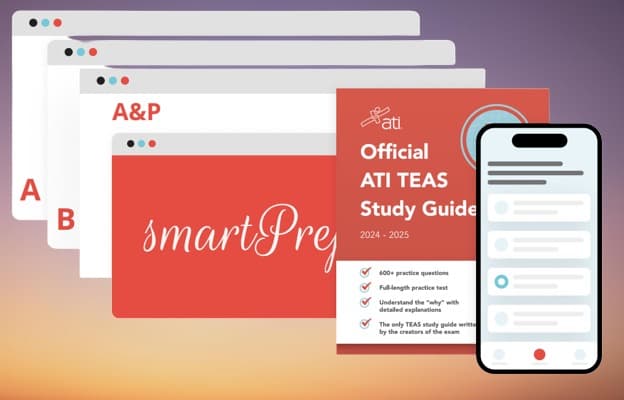Introduction
In preparation for the biology questions, aspirants ought to focus on high-value concepts as these are the most likely questions they will encounter. A great starting point would be to prioritize physiology and anatomy. Also, understand microbiology, genetics and DNA, mitosis and meiosis, and macromolecules.
This article will help you prepare for the biology section of the TEAS test by covering different aspects of the subject. It will include an in-depth review of the key concepts to consider, important biology study tips, resources for biology preparation, and common mistakes to avoid while preparing and during the exam.
Understand the Role of Biology in the TEAS Test
Understand that the science section of the TEAS test assesses your knowledge of biological processes and systems, scientific reasoning, physics, and chemistry. Biology, a significant part of the science section, covers nine questions on fundamental concepts. These topics include genetics, cell biology, mitosis and meiosis, organelles, DNA, and microbiology.
Ensure you create a structured study schedule for studying the biology section. Your schedule should allocate more time to the topics you find more challenging in biology. Use TEAS test biology practice materials to cover as many questions as possible and improve your confidence in tackling the questions.
The TEAS exam uses an equating method to determine exam scores. Specific question categories are given more weight than others when equating. However, there is no way for you to tell which questions are more important. Therefore, assigning each question an equal weight in the biology section makes sense.
After finishing the test, you will receive a composite score and a subscore for every subject area. Your subscores reflect your success in each exam section, while your composite score reflects your overall performance.
Your primary score is the composite score; however, specific programs may require you to meet a minimum requirement for each of the four TEAS components. The biology or other sections of the test do not have a predetermined weightage. That is why you have to tackle every question diligently. Aim for the Proficient score range and above, which is 58.7% to 79.3%, to prove that you have general academic awareness in nursing.

Key Biology Concepts for the TEAS Test
Below are the vital biology concepts to consider for the exam.
1. Cell Biology
It is a fundamental topic in biology that explores cells’ function, structure, and behavior. Understanding this concept is crucial since it encompasses several biological concepts. Issues found in cell biology may include cell membrane function, cellular transport mechanisms, cellular metabolism, organelles, and cell structure. Comprehending these topics will give you an edge in the forthcoming test.
2. Human Physiology and Anatomy
This topic in biology looks at the structure and function of the human body and the different organ systems. Students ought to understand this concept, which entails understanding the body’s organization from the cellular level to tissues, organs, and organ systems. Some key topics in this area include the respiratory system, skeletal system, muscular system, digestive system, endocrine system, nervous system, urinary system, reproductive system, and cardiovascular system. To succeed in your TEAS test, you must comprehend the anatomical structures, their functions, and how the systems interact.
3. Genetics
Genetics covers the study of heredity and variation in living organisms. The topic includes gene expression, inheritance patterns, DNA structure and replication, genetic disorders, biotechnology applications, and genetic mutations. The review on genetics will help you understand concepts related to population genetics, inheritance of traits, and evolution. TEAS questions on these topics may assess your knowledge of basic genetic principles such as genetic disorders, Mendelian inheritance, or Punnett squares.
4. Ecology and Environmental Science
This biology section explains the interaction between organisms and their immediate environments and examines human activities’ impact on the planet and ecosystems. Crucial concepts in this field include population dynamics, ecosystem structure and function, nutrient cycling, energy flow, community interactions, pollution, climate change, biodiversity, sustainability, and conservation biology.
Understand these concepts to recognize how living organisms interrelate with their environments and the essence of sustainable practices. You will also have a better chance of succeeding in your exam since these are the topics you will encounter.
Study Tips for TEAS Biology Review
You can do different crucial things to increase your chances of succeeding when studying biology for the test. This section of the test covers the essential study tips to exhaust your revision for the biology section.
- Create a study schedule—a study schedule is crucial as it helps you manage your time effectively and ensure you cover all the biology concepts. Break down the content into manageable chunks and allocate time slots for every topic. Consider your learning pace and ensure you allocate more time to the challenging concepts.
- Utilize visual aids and diagrams – visual aids and diagrams enhance student’s understanding and retention of biological concepts. These diagrams help visualize dynamic processes such as mitosis, cellular respiration, or the structure of biological molecules. Utilize existing diagrams to illustrate critical concepts and structures. Visual information makes understanding complex ideas easy and facilitates memory recall.
- Use active learning techniques. These may include practice tests, quizzes, and flashcards. Active learning techniques help students retain information and reinforce their understanding of biology concepts. Consider creating flashcards for definitions, key terms, and processes and reviewing that information regularly. Take practice tests and quizzes to assess your level of readiness and identify the areas that require more attention.
- Use group study sessions and peer teaching—Studying with peers offers valuable opportunities for peer teaching and collaborative learning. Ensure you organize group study sessions where you examine the concepts for more understanding. Collaborating with peers will help solidify your knowledge and comprehension of the topics.
Important Topics to Focus on for TEAS Biology
This section covers some critical biology concepts you should understand as you prepare for the test. You must be thoroughly prepared since you usually encounter most of these topics in the exam.
1. Major organ systems and their functions
You will most probably encounter a question about the major organ systems in the human body. That is why you have to focus on topics such as the muscular system, skeletal system, respiratory system, nervous system, digestive system, cardiovascular system, reproductive system, urinary system, and endocrine system. Understand the structures and functions of all these systems and how they interact to support overall health.
2. Cellular processes
Another major topic to focus on is the cellular processes. These include cellular respiration, photosynthesis, meiosis, and mitosis. They are the foundations of biology and are highly covered in the exam. Ensure you understand every stage and significance of the processes involved and how they sustain life and maintain biological functions.
3. Genetics (DNA Structure, inheritance patterns, Punnett squares)
Genetics is often tested in the exam. Examine inheritance patterns (non-Mendelian inheritance and Mendelian), Punnett squares, which predict offspring genotypes and phenotypes, and DNA structure, which may include nucleotides, double helix, and base pairing. Also, look into the common genetic disorders and traits.
4. Basic Ecology Concepts
These are basic concepts in ecosystem dynamics, biomes, and food chains. They are critical topics in biology and examinable in the test. Strive to understand ecology and how it affects organisms. Ecology studies how living organisms interact with their environment. Focus on energy flow through ecosystems, large-scale ecological communities characterized by different climates and vegetation, environmental succession, nutrient cycling, and population dynamics. Understanding these concepts will set you up for success.
Resources for Effective Biology Preparation
Biology preparation requires the effective use of reliable resources. To prepare for the biology section, you could use different resources, such as online courses, video tutorials, study guides, textbooks, practice questions, and mock exams.
1. Recommended Textbooks and Study Guides
Use study guides and textbooks that cover topics mainly tested. These resources, such as popular biology textbooks like Campbell Biology or Molecular Biology of the Cell, must be specially made for TEAS test preparation. Also, look for reputable study guides on top platforms and gather more information from them.
2. Online Courses and Video Tutorials
Video tutorials and online courses offer accessibility and flexibility for biology preparation. These are impeccable revision materials since they are self-paced learning opportunities. You study at your pace and re-read as much as you like to grasp the concepts thoroughly.
Look for popular YouTube channels such as Amoeba Sisters or Crash Course Biology to find engaging and informative biology content. Online courses are also a great resource as long as they are from a reliable source. They must have quizzes and practice exams for you to attempt.
3. Practice Questions and Mock Exams
These are invaluable resources to assess how you are doing in preparation for the biology section. Reliable websites offer students these materials, such as ATI testing, NursingPrepExams, or Quizlet. Take the mock exams, as the questions are tailored to the biology section questions. Handle various questions in different formats and topics to assess your readiness to sit for the test.
Common Mistakes to Avoid in TEAS Biology Preparation
This section assesses the common mistakes students make when preparing for the test.
- Cramming vs. consistent study habits—One major mistake aspirants make is to rely on last-minute cramming rather than engaging in consistent study habits. Biology covers many topics and information; trying to absorb everything quickly would prove futile. Cramming is not practical, as little interruptions will make you mix up concepts and ideas. Engage in sustainable, consistent study sessions for better retention and understanding of key concepts.
- Neglecting practice questions and timed tests—While reviewing the biology concepts is prudent, it is equally important to practice with an actual exam that is timed with TEAS-style questions. It helps you familiarize yourself with the pacing, type of questions asked, and format. Avoiding these tests could lead to underperformance and anxiety on test day.
- Overlooking application-based questions—Biology questions require knowledge application and not a simple recall. Do not overlook the application-based questions, which will add up your score. When revising for the test, do not memorize facts alone. Ensure you understand the concepts and how to apply them to solve problems or analyze different scenarios.
- Not seeking clarification on complex concepts—most aspirants assume they understand all concepts even when they feel they have never grasped the idea. There is no harm in asking for help whenever you are stuck. If you struggle to learn a concept in a given topic, do not ignore it, as you could encounter it in the exam. Contact tutors, online resources, or instructors and ask for help. Understanding as many concepts as possible will boost your morale and chances of success.
Conclusion
The TEAS test biology review is an essential aspect of test preparation. It helps students understand the relevance of biology in the science section, the key concepts to focus on, and the critical study tips to adhere to. Consistent study practices and lots of practice will set you up for success. Take many mock exams and familiarize yourself with the exam format to remain calm during the exam day. Lastly, believe in yourself and your abilities to apply all learned concepts in the test.




